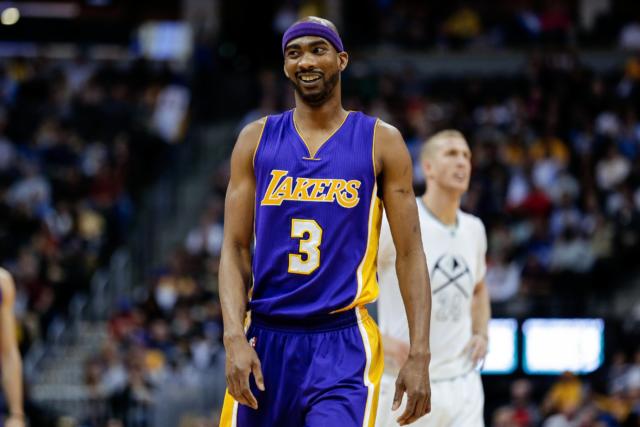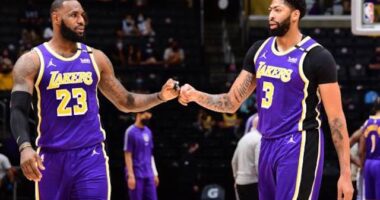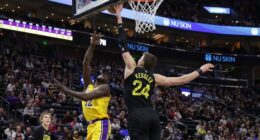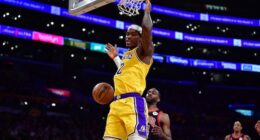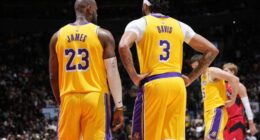At 14-25, the Lakers are in the midst of one of their worst stretches of games since 2005. Even at their lowest point during last year’s “Season of Hell” they were never more than eight games under .500. While injuries to key players can be pointed to as the most glaring explanation for them having lost 12 of their last 13, the unlikelihood of them making this year’s playoffs shouldn’t come as a surprise to anyone.
The fact that the Lakers were 13-13 through their first 26 games was one of the more surprising things to happen in the first two months of this NBA season. Even more surprising was that six of those 13 wins came on the road and three of those six road wins came on the second night of a back-to-back. For a team that the Las Vegas Hilton Sportsbook predicted would win around 33 games, they were only 20 wins shy of getting there with 56 games still left to play.
Since winning their 13th game against Minnesota on Dec. 20, the Lakers have only tasted victory once — a narrow home victory against the Utah Jazz, the team with the worst record in the Western Conference and the second-worst record in the entire league. And while multiple injuries to a team that was already lacking in top-tier talent have made life difficult, it was the timing of those injuries that derailed a season that was a lot more fun than anyone could have anticipated. The team had just begun a stretch of 24 of 37 games away from home before guys started dropping like flies. For the second consecutive season, the worst scenario seemed to happen at the worst possible time.
The reason why last year felt like a season-long uphill battle was because it was. They had failed to capitalize on what was an extremely home-heavy schedule to begin the season, with nine of their first 11 games at Staples Center. Instead of going 9-2 or 8-3, they went 6-5 before embarking on a stretch of 15 games out of 24 on the road. By the time they were through with those first 35 games, they were a lackluster 15-20 and the laughingstock of the entire sports world. They went from preseason favorite to no longer being considered a contender, and there was still more than a month left until the All-Star Break.
This current team’s ability to stay afloat early, combined with the slow starts of teams considered locks for the playoffs, afforded the Lakers the luxury of being able to withstand a below-average showing during this all-important stretch. Even if they were to go 15-22, they still wouldn’t have been written off as a playoff team just yet.
Through the first 25 games of the 37-game stretch, the Lakers are not only just 7-18, but the most difficult part of the stretch is still ahead of them. After Wednesday’s loss to Phoenix, the Lakes still have six games left on their annual 7-game Grammy road trip. Still to come are stops in New York, Toronto, and Miami. After the road trip they return home for two games against Indiana, the team with the NBA’s best record, and the Charlotte Bobcats, the team that has been a pebble in the Lakers shoe since their inception. Then they go back on the road for three games in four days against Minnesota, Cleveland, and Philadelphia.
Even with seven wins already under their belt and 11 more games still to be played on the 37-game stretch, the numerous injuries have made even a 10-27 record seem extremely optimistic. They might even finish worse than what Vegas predicted.
The reality is that nobody, especially the front office, thought this team was going to win the majority of these 37 games, whether they were healthy or not. Even the best teams would be expected to go 14-10 in 24 road games. A 19-18 overall record from this roster would have been considered a minor miracle. What the front office didn’t anticipate was that the Lakers would lose home games to Toronto, Philadelphia, Milwaukee, Phoenix, Denver, and Cleveland.
After the Lakers split their first 14 games of the regular season, the front office had to consider that with the schedule about to get ridiculously more difficult, there was a pretty good chance that 7-7 record could be the high point of the entire season. All of which makes the timing of Kobe’s two-year extension not nearly as random or even premature as originally thought. It can’t be just a coincidence that the Lakers wrapped up the extension on the eve of playing their first game of the 37-game stretch.
Forget about how you feel about how much money the extension is for its salary cap implications. The Buss family and GM Mitch Kupchak were fully aware of what was on the horizon. Is there a chance it could just be a coincidence? I guess. But it makes a lot more sense that they would want to lock him up while he was still feeling good about the team’s chances. That’s become a little more apparent now that the team is staring at a record around 20 games under .500 once they’ve played all 37 games.
For the sake of argument, let’s pretend for a second that they hadn’t re-signed Kobe on Nov. 25. Flash forward to the last game of the stretch in Philadelphia next month. Suppose they lose that game in Philly on Feb. 7 and return home with a 15-36 record and they’re 15 games out of the last playoff spot in the west. If the Lakers made the exact same offer to Kobe on Feb. 8, would he sign it?
Other than for financial reasons, what incentive would Kobe have to stay with this bad of a team? More specifically, what incentive would he have to sign it in the middle of the season? As good as this year’s draft class is, it’s not like there is anybody in it that would make this current Lakers team a contender without at least one more star player joining them.
There’s no telling what kind of toll all of this losing will have had on either Kobe’s psyche or his opinion of their future, regardless of how many games he plays in this season. There’s a very good chance that if he was offered that contract right now or on Feb. 8 that he would decline it and opt to put off contract talks until after the season.
It isn’t crazy to think the Lakers biggest fear wasn’t losing a basketball player so much as it was losing one of the most famous active athletes in the world, if not the most famous. Losing relevancy would come at the expense of losing Kobe. While the iron wasn’t necessarily hot when the Lakers decided to strike it by signing Kobe to that extension on Nov. 25, there’s no telling how cold that iron might be at the conclusion of this stretch.
Even with the loss of Dwight Howard, a roster picked to win 33 games, and the uncertainty of when Kobe would return from his torn Achilles, the Lakers were still chosen for 29 national TV broadcasts this season, two more than defending champion Miami. That’s the type of relevancy that Kobe brings.
We know this because something happened in past few weeks that gave the Lakers a glimpse into what life might be like post-Kobe. Last week’s Kobe-less game between the Lakers and Rockets was dropped by ESPN in favor of a Suns-Timberwolves game. That was followed by next week’s Lakers-Bulls game, which Kobe will also miss, getting dropped from TNT’s Martin Luther King Day doubleheader and replaced with Blazers-Rockets.
While a franchise as successful as the Lakers will never actually be irrelevant, there is a very real existing threat to them becoming much less relevant. Unlike in years past, they are now faced with the additional pressure that comes with a $3 billion television deal and from another source much closer to home. While the Clippers will never be more popular than the Lakers they do have a chance to cut themselves a much bigger slice of the local pie. Whereas last season’s playoffs were disappointing for both teams, this year the Clippers should have the entire playoff spotlight to themselves.
There’s no denying that as long as Kobe is on the Lakers, they will always be more relevant than the Clippers. We know this because when the Clippers were in the midst of their franchise-best 17-game winning streak last year, the main topic every day on local sports radio was still, “What do the Lakers need to do to improve?”
If Kobe were to wait until the end of the season to sign that extension there’s a real possibility that the Lakers might have had to offer him even more money not to leave a team that might struggle to win 30 games. Some might say they shot themselves in the foot by signing him to that extension when they really might have dodged a bullet by locking him up early. In a way, both are correct.
With the best of the 2014 free agents likely to remain with their current teams, at least we know what the team’s priorities are. They went for the known over the unknown. The front office must have felt they had a better chance of fielding a competitive team around Kobe’s new contract than they did of getting Kobe to stick around on a team that will lose 50 games — something only one Lakers team has done in the 54 years since moving to Los Angeles.
From a business perspective, the Lakers did what was best for their brand, their balance sheet, and their immediate future. From a basketball perspective, they definitely made things more difficult for themselves. As for how difficult, we’ll just have to wait and see.
